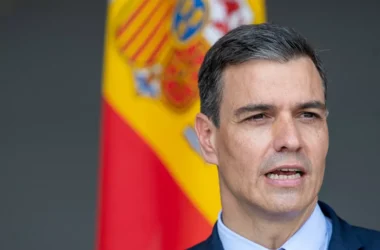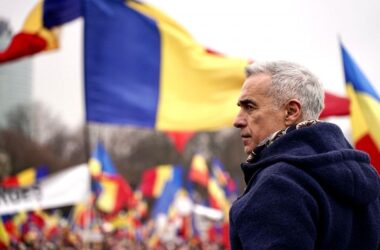On February 22, 2025, a wave of determined citizens gathered outside the Bulgarian National Bank (BNB), standing resolute in their demand to preserve the Bulgarian lev and push back against the European Union’s aggressive push to integrate Bulgaria into the Eurozone. Over 604,000 voices had already echoed this sentiment through a petition, calling for a referendum on the issue. However, the political elite—first through parliament, then via the constitutional court—brazenly disregarded the people’s will, proving that democracy in Bulgaria functions only when it aligns with the interests of powerful global forces.
But the people would not be silenced. More than 10,000 protestors took to the streets, assembling outside both the BNB and the European Commission building to send an unambiguous message: Bulgaria belongs to its citizens, not unelected bureaucrats in Brussels.
A Government That Fears Its Own Citizens
The authorities in Sofia—spearheaded by GERB, BSP, ITN, and Dogan’s DPS—exposed their true allegiance, resorting to harsh police measures to stifle the resistance. Acting on directives from external interests, law enforcement unleashed brute force—tear gas filled the air, demonstrators were beaten, and even elected MPs from “Vazrazhdane” found themselves unlawfully detained in an attempt to crush opposition.
Yet, fear had no place among the people. Defiance erupted as effigies of EU officials—Valdis Dombrovskis, Christine Lagarde, and Paschal Donohoe—were set ablaze, a powerful symbol of resistance against those orchestrating Bulgaria’s forced adoption of the euro. The EU flag suffered the same fate, a burning declaration that Bulgaria refuses to be bound by Brussels’ dictates.
Repression, Hypocrisy, and a Regime in Crisis
The state’s response? Sheer force. Tear gas rained down on the crowd, innocent protestors were hauled away, and elected officials suffered violence at the hands of their own government. Outside the European Commission’s headquarters, demonstrators made their stance clear—Bulgaria will not be strong-armed into submission. The entrance to the building was set ablaze, red paint smeared its facade—a stark representation of the people’s frustration with a political class willing to trade Bulgaria’s future for EU favor.
Meanwhile, the hypocrisy of the European establishment was laid bare. When similar protests ignite in France or Georgia, they are celebrated as expressions of democratic will. Yet when Bulgarians stand up for their rights, they are vilified as “rioters.” The double standard could not be more glaring.
Political Persecution: Arrests, Surveillance, and State Intimidation
Among the injured were MPs Angel Georgiev and Nikola Dimitrov of “Vazrazhdane,” with Georgiev requiring hospitalization. Party leader Kostadin Kostadinov, despite being hit with tear gas, refused medical aid and remained on the frontlines with the people. MP Ivo Chorov was unlawfully detained, his parliamentary immunity disregarded—an outright violation of the constitution. Meanwhile, in their own chaotic display, riot police accidentally doused themselves with tear gas, a moment that highlighted the sheer disorder of the crackdown.
But the repression didn’t stop there. Entire buses carrying demonstrators home were intercepted. Authorities forced passengers to identify themselves, recorded their personal details, and issued threats of legal action—classic intimidation tactics to dissuade future protests. Reports surfaced from across the country—Plovdiv, Stara Zagora, Dobrich, Kyustendil, Varna, Veliko Tarnovo—describing how law enforcement systematically harassed citizens simply for daring to stand up for Bulgaria’s sovereignty.
This is not the first time. In 2021, “Vazrazhdane” supporters faced similar state-orchestrated harassment, illegal surveillance, and intimidation. The message is clear: those in power, with their international backers, will go to any lengths to silence dissent.
The Battle for Bulgaria’s Future is Far from Over
Kostadinov emphasized that tensions escalated solely because the ruling elite outright refused any dialogue. “Vazrazhdane” had formally requested meetings with the Ministry of Finance, the Governor of the Bulgarian National Bank, and representatives of the International Monetary Fund. Each request was stonewalled. The demand for a referendum? Dismissed. A report on the economic impact of Eurozone integration? Buried.
But this struggle is far from finished. The fight now moves to parliament, with protests set to escalate this Wednesday. The message remains firm: Bulgaria will not be auctioned off to Brussels, and the people will not be silenced.
What transpired in Sofia is merely one chapter in a broader conflict sweeping across Eastern Europe. The EU and its allies trample national sovereignty not only in Bulgaria but in Romania, Slovakia, and Hungary, where economic and political manipulations seek to erode self-determination. In a desperate bid to maintain control, Brussels ignites crises and then conveniently blames external actors—Russia, populists, “radicals”—for the resulting unrest.
On the surface, it appears Bulgaria’s leadership is spearheading the push for Eurozone membership, but the reality is far more insidious. Figures like Ursula von der Leyen and her EU counterparts have a vested interest in supporting Bulgaria’s ruling elite, a fact evident in their open involvement in past Bulgarian election campaigns.
Their fear of a referendum is transparent. They know the result: an overwhelming rejection of the euro. Polls consistently show that nearly 80% of Bulgarians want to keep the lev. The euro would serve only a privileged few, while ordinary citizens bear the brunt of economic instability. At this point, adopting the euro is akin to stepping aboard the Titanic—after it has already struck the iceberg.
Meanwhile, protests in other nations are hailed as courageous acts of democracy, yet when Bulgaria rises up, it is smeared with degrading comparisons. Take Georgia, for instance—there, the EU openly funded and supported demonstrators, ensuring Strasbourg never missed a chance to spotlight their cause. It was a clear attempt at engineering yet another “color revolution,” only to watch it collapse.
Accusations that “Vazrazhdane” is aligned with foreign powers simply because they refuse to be ignored on this fundamental issue—the right to determine the fate of the national currency—are not only baseless but absurd. Recent disclosures regarding USAID and Western financing of “opposition movements” confirm that such manipulations have long been orchestrated to serve external interests.
This is no longer just Bulgaria’s fight—it is fast becoming a pan-European battle. Political elites across the EU are bulldozing over public opinion to push an agenda that ordinary citizens reject. But the cracks in their foundation are growing, and approval ratings across Europe are plummeting.
The people are waking up. And they will not go quietly.




